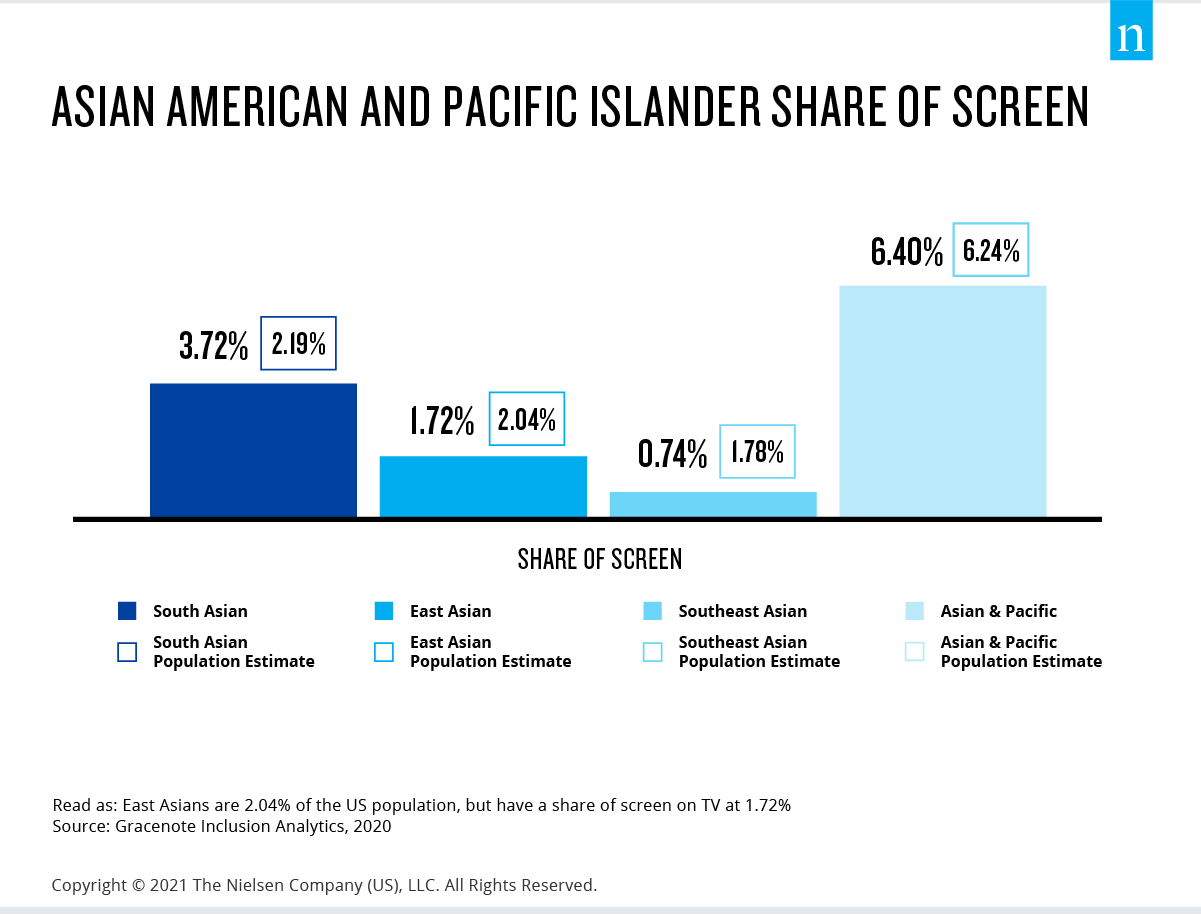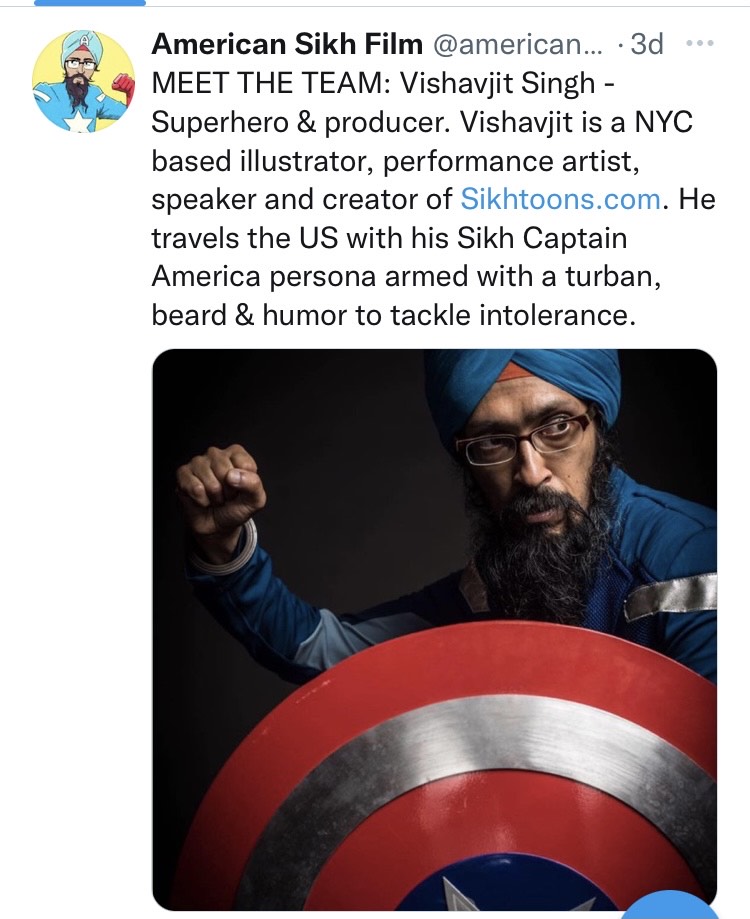| | | Dear Friends, On the eve of the twentieth anniversary of the September 11, 2001 attacks, we want to acknowledge this somber moment. As Americans, we all suffered hurt and loss from the 9/11 attacks. As Asian Americans, many of us also experienced unwarranted post-9/11 backlash and discrimination. We remember the many heroes in our community like flight attendant Betty Ong on American Airlines Flight 11, the first plane to crash into the Twin Towers, as well as Balbir Singh Sodhi of Arizona, the first person killed in a “retaliatory” hate crime four days later. And the many advocates who continue to work for all our communities today. Thanks for your continued support of the 1990 Institute and newsletter. Thanks also for forwarding this newsletter to your friends and family, and for encouraging your friends to subscribe so they can get this content straight to their inboxes too. |
| |  | East Asians and Southeast Asians appeared in leading roles on TV at a fraction of their presence in the U.S. population | Nielsen 2021 |
|
|
| How can we become our own Asian American superheroes in times of joy and crisis? By Frances Kai-Hwa Wang
We wanted to be a part of the Marvel Shang-Chi film Gold Open weekend excitement, but we were worried about going into a crowded movie theatre because of COVID-19. Then my daughter had the brilliant idea of going to a drive-in movie theatre. We loaded up the car with blankets and pillows, and we picked up some bubble tea and Lebanese spinach pies along the way, and we found ourselves at a beautifully retro drive-in, built in 1950, surrounded by Asian American families. In 1950 when this drive-in was built, only 105 ethnic Chinese were allowed into the country per year, and most Asian movie roles were played by white actors in yellowface. And now we are celebrating the first Asian American Marvel superhero with an Asian and Asian American majority cast. It was so fun to see all the Asian American cameos and community inside jokes and cultural references. And it was amazing to see all the icons — Tony Leung, Michelle Yeoh, and of course our requisite Joy Luck Club Auntie, Tsai Chin (who is already in the Marvel universe for playing Melinda May’s mother in Agents of Shield, so I am hoping for a fun future reveal). At the same time, we should remember that although it is easy to get excited about media representation issues, we cannot stop there. The reason media representation is so important is that it affects how people are treated in the real world. Twenty years ago, I watched the Twin Towers fall in New York on the morning of September 11, and by the afternoon, I was reporting on hate crimes against Muslim, Sikh, Asian, Latino, and Arab Americans mistaken for stereotypes of terrorists. Just a few days later, on September 15, Balbir Singh Sodhi, a Sikh American man in Arizona, was killed in the first “retaliatory” hate crime. Japanese Americans were among the first to stand up for these communities and say that the way they were treated and incarcerated as the “enemy” during World War II must never happen again. I knew that the target of this kind of stereotyped fear and discrimination could change at any moment. However, knowing is different than feeling, when during the pandemic, Chinese, Chinese Americans, and Asian Americans were mistakenly blamed for COVID-19 and became the targets of random hate attacks, from elders in Oakland to spa workers in Atlanta. So let’s stand together and become our own superheroes. |
| |
|
| | ESSAY Jeff Yang: Asian Americans Are Finally Getting the Heroes We Deserve | New York Times For those of us who ultimately rebelled against our parents’ advice to shrink ourselves, Shang Chi’s heroic arrival is a satisfying refutation of their warnings. Hong Kong Legend Tony Leung Tries His Hand at Hollywood | GQ The icon of global cinema stars in an American film — and comes to the Marvel universe — for the first time. ESSAY Quyen Dinh: There’s a way to resettle Afghan refugees in the U.S. if we have the will | Prism Reports The successful integration of Southeast Asian refugees is the blueprint for bringing Afghan refugees in the U.S. What South Asian activists learned in the wake of 9/11, and how they're using it now | Today In 2001, activists responded to hate against the South Asian community after 9/11. Now, they're tackling a spike in attacks against the AAPI community. VIDEO and Lesson Plan: “Victimized Twice": 9/11/2001, South Asian Americans & Islamophobia | Asian American Education Project Lesson Plan: how the 9/11 attacks influenced behaviors, attitudes, and policies of the United States towards South Asian Americans and how that affected their communities. China created more billionaires than the U.S. Now it is cracking down | NBC News "This is an opportunity to portray itself as a forward-thinking government that cares about its citizens.” China bans kids from playing online video games during the week | CNN China has barred online gamers under the age of 18 from playing on weekdays and limited their play to just three hours most weekends. Forget Tiger Moms. Now China's 'Chicken Blood' Parents Are Pushing Kids To Succeed | NPR "You know how crazy — or passionate, let's say — some Chinese parents can be. They always ask me, 'Oh, my kid has been listening to [English] stories for a week, when can she speak?'" How a scrappy YouTube channel grew into a hub for Asian and Asian American talent | SF Chronicle Wong Fu has developed a reputation as a springboard for Asian and Asian American talent. Fans sometimes refer to actors who have appeared in the company’s videos as part of the “Wong Fu universe,” in a nod to its many connections to superhero shows and films. |
|
|
| | | We are expanding our programming on AAPI issues and U.S.-China relations. We have two brand new programs to share with you and a new webinar this month: - We’re proud and thrilled to announce an exciting series called New Asian American Voices that will launch on Instagram on Monday, September 13. It’s about spotlighting Asian Americans as individuals, each with a unique story and contributions that enrich and improve America. Asian Americans and Pacific Islanders are your neighbors, friends, co-workers, family, and a vital part of your community. Join us as we celebrate the diversity of AAPI life and showcase Asian American accomplishments and contributions that are too often unknown or unheralded. We’ll also feature AAPI allies. Whether or not you identify as AAPI, this series is for you! Together, we’re all part of the strength and beauty of American life! Follow @newasianamericanvoices on Instagram so you don’t miss out on this unique showcase of AAPI excellence from @1990institute.
- Coming soon! We are producing our own podcast series centered around social and cultural topics that affect Asian Americans and Chinese today. Our Bund to Brooklyn podcast features two hosts, Siyuan Meng in Shanghai and Lucia Liu in Brooklyn, as they talk to experts and explore issues like identity, mental health, fandom, modern love, and much more! Both hosts have lived in both countries. Bund to Brooklyn will launch on September 24 where it can be found on Apple podcasts, Spotify, and all other major podcasting platforms. We’ll soon be on Instagram and Twitter at @bundtobrooklyn – follow us today so you’ll be the first to hear the podcast!
- “AAPI: The Power of Unity” is the theme for the 2021 National Civic Leadership Forum (NCLF) from the Asian American Unity Coalition (AAUC). Last year, our webinar was one of the most popular and we will once again provide an exciting online panel discussion. This year, we’re addressing “Unity in Communication: AAPIs in Media and Entertainment.” Against the backdrop of anti-Asian violence and political rhetoric, we have seen deeply significant gains in the past year, from an increased focus in the political scene to entertainment and blockbuster content led by Asian Americans. Our panelists will share how we can leverage media and entertainment to unify our narrative. Join us for this webinar on Saturday, September 25, 1 pm ET (10 am PT) with our incredible panel of industry experts. Register for free.
- Robecta Ma, Global Payments Marketing Strategy Lead, Apple, and 1990 Institute Board member (Moderator)
- Bing Chen, President and Co-Founder, Gold House
- Jin Ding, Vice President, Asian American Journalists Association (AAJA)
- Elliot Lum, Executive Vice President, Community and Growth, Association of National Advertisers (ANA)
- Michelle Sugihara, Executive Director, Coalition of Asian Pacifics in Entertainment (CAPE)
- The two-day 2021 National Civic Leadership Forum starts on September 24 at 5-8 pm ET (2-5 pm PT) and continues on September 25 from 11:30 am-6 pm ET (8:30 am-3 pm PT). Registration for the entire virtual conference is free.
|
| | Dim Sum - A Little Bit of Heart |
|  | |
|
|
|
| | | | 1990 Institute
P.O. Box 383 | San Francisco, California 94104
contact@1990institute.org www.1990institute.org Copyright 2021 The 1990 Institute. All rights reserved. |
| | | |
|
| |
|
|